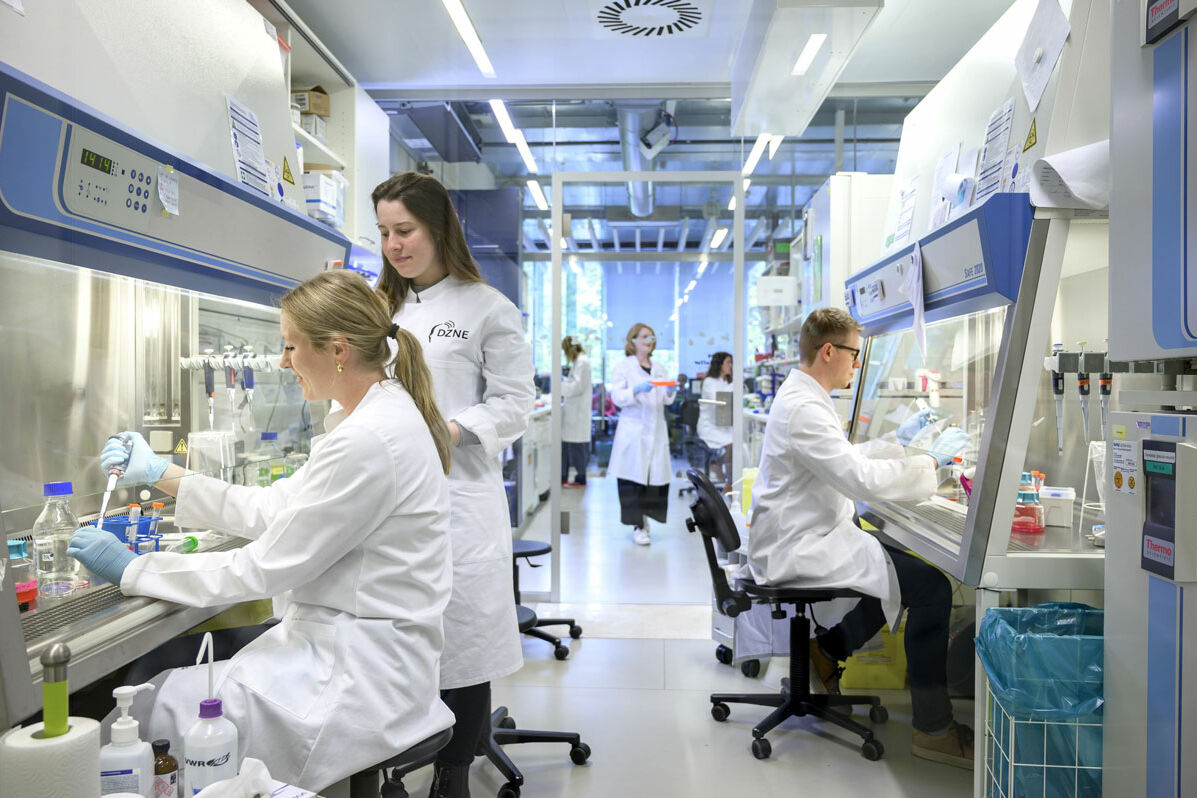European Research Council Funds Study on Drug Repurposing at DZNE
Göttingen/Germany, March 2, 2022. Prof. Markus Zweckstetter, a scientist at DZNE’s Göttingen site, has been awarded 150,000 euros by the European Research Council (ERC) to test potential drugs against Alzheimer’s disease in laboratory studies. This will involve investigating two compounds that inhibit the clumping of so-called tau proteins. The aim of the project, which is funded by a proof-of-concept grant, is to find a promising drug candidate for clinical trials in humans.
In the brains of people with Alzheimer’s disease, proteins stick together to form tiny clumps: while outside neurons amyloid peptides cluster together to form so-called plaques, inside neurons aggregates of a protein known as “tau” occur. “Aggregates of tau proteins are considered neurotoxic; moreover, there is a strong link between the accumulation of tau and the development and progression of Alzheimer’s disease. Tau aggregation is therefore considered an important disease mechanism and a potential target for therapies. This is where our investigations come in,” says Markus Zweckstetter. “An effective remedy against tau aggregation would have broad potential for application. This is because tau aggregates occur not only in Alzheimer’s, but also in a whole range of other neurodegenerative diseases.”
Expanding the Range of Uses
In earlier studies, the Göttingen biophysicist and colleagues were able to identify two chemical compounds that prevent the aggregation of tau and whose effect they now intend to investigate in more detail. Both substances are “small molecules”, and therefore chemically quite simple. “We have applied for a patent, which is why I cannot go into more detail about these substances. However, both compounds have been tested in clinical trials on humans, and one of them has even been approved as a drug in the U.S. and the EU. However, not for the treatment of Alzheimer’s or other neurodegenerative diseases,” Zweckstetter says. “We consider the drug that has already been approved to be particularly promising because it has been shown that it can reach the brain. We don’t know yet about the other compound. We will investigate this as part of our project.”
Zweckstetter adds. “What we are aiming for is called drug repurposing. It’s about expanding the application range of an already approved drug. The advantage of this approach is that it’s already been proven that the drug is well tolerated by humans.”
Small Droplets
Research by Zweckstetter’s team suggests that the two compounds interfere with a physical process called “liquid-liquid phase separation”. “This phenomenon causes tau proteins to concentrate in a very confined space. As a result, tiny droplets containing tau proteins are formed within the cellular fluid. We believe that this droplet formation is a requirement for aggregation. If you disrupt the formation of such droplets, you also prevent tau proteins from clumping together. This is exactly what the compounds we found are doing. They are ultimately aggregation inhibitors,” Zweckstetter says.
In laboratory experiments and also in cell cultures, the Göttingen scientists were able to establish this effect for each of the two drug candidates. They also tested the impact of the compounds on fruit flies. The studied insects produced too many tau proteins as a result of a gene mutation. However, the resulting nerve damage was less severe when either of the compounds was added to the fly food.
Basis for Clinical Trials
With the ERC funding, the effect of the two compounds will now be examined under further conditions. To this end, Zweckstetter’s team is cooperating with colleagues at DZNE’s Bonn site. In the planned studies, the drugs will be administered to mice whose organisms produce tau proteins in excess due to a specific genetic constellation – similar to the fruit flies already studied. This overproduction leads to brain damage that resembles the pathology observed in Alzheimer’s disease. “We’ll look at whether treatment alleviates cognitive deficits. If it does, we would have a solid basis for clinical trials in humans. If it gets to that point, we plan to collaborate with a pharmaceutical company, because drug trials require resources from industry,” says Zweckstetter.


![[Translate to Englisch:] ERC Logo [Translate to Englisch:] ERC Logo](/fileadmin/_processed_/f/1/csm_LOGO-ERC_1_5b4a02ecf4.jpg)